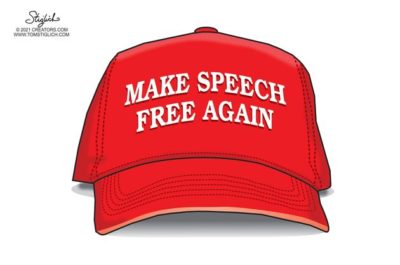My headline quotes Nicolas Barry. He’s America First Legal Senior Counsel, and he points out the problem the Trump administration will need to wrestle with if it intends to ‘Shatter the left-wing censorship machine.’ You can fire public employees (it is not always easy, but it can be done), investigate them for suppressing protected speech, and defund and disable agencies or factions within them, but the infection is widespread.
You need to extend the treatment to everyone who touches federal money, which, by extension, makes them accountable to Federal will. The strings that encouraged willing or unwilling accomplices to censorship must be yanked to undo it.
I was going to add, ‘or the money train comes to an end,’ but that needs to happen on a scale so grand it makes little sense to include it in that context. If some particular laundromat gets shut off, they can decide if continuing to peddle the Misinformation, Disinformation, and malformation (MDM) narrative is worth the time. If it wants to keep that Federal sugar daddy relationship alive, the federal grants for things that might be useful (whatever they might be, but few and far between) will have to decide. Actual censorship – not the faked variety peddled by libraries that want to sexualize little kids – or the gravy train.
Researchers, in particular, live and die on these grants. We should respect a few of them to include clauses that prohibit the kind of censorship we’ve seen under Obama or Biden. Or, you could choose to get sued.
“Private entities cannot be permitted to partner with the government to censor Americans’ speech,” Nicholas R. Barry, America First Legal Senior Counsel, said in a statement.
Younes told the DCNF she would like to see “punishment for government actors who have violated Americans’ First Amendment rights.”
“At this time, such individuals manage to escape accountability for their actions because of doctrines like qualified immunity,” she said. “However, there can be exceptions to qualified immunity when government officials knowingly flout people’s civil rights, and those exceptions should be applied in the First Amendment context.”
Trump’s other suggestions included firing bureaucrats who have engaged in censorship, ensuring federal dollars do not go towards nonprofits and universities labeling domestic speech as misinformation and asking Congress to revise Section 230 to “get big online platforms out of censorship.”
Trump’s Civil Rights Division can and will focus on federal, state, and local infringements on actual civil rights, of which the First Amendment is…the first. State, local, and any federally funded entity that foments the MDM narrative should expect a look-see from the Trump administration, a likelihood that informs observations about big tech offering inauguration event donations to Donald Trump. We didn’t want to do it but felt we had no choice.
And do the Feds take it another step and is it a step too far?
I don’t want the Federal Government to regulate speech on private platforms. Still, we should ask ourselves if the Founders would see the internet as nothing more than a capitalized digitized free market square where making money on speech (especially on social media platforms) is not a crime, but suppressing it might be.
The government needs to get out of the business of using private or semi-private interests to censor speech, but how they do that matters.
